Cracks in your brick chimney or masonry chimneys are more than just cosmetic—they threaten chimney safety and can lead to costly repairs. Even small cracks or minor chimney damage can let water intrusion or moisture damage reach your bricks and mortar, weakening the structure over time.
At GMT Home Services, we specialize in chimney crack repair and brick chimney repair, ensuring your chimney stays structurally sound and safe for your home and family.
Understanding why cracks occur helps prevent further deterioration. Most homeowners encounter these most common problems:
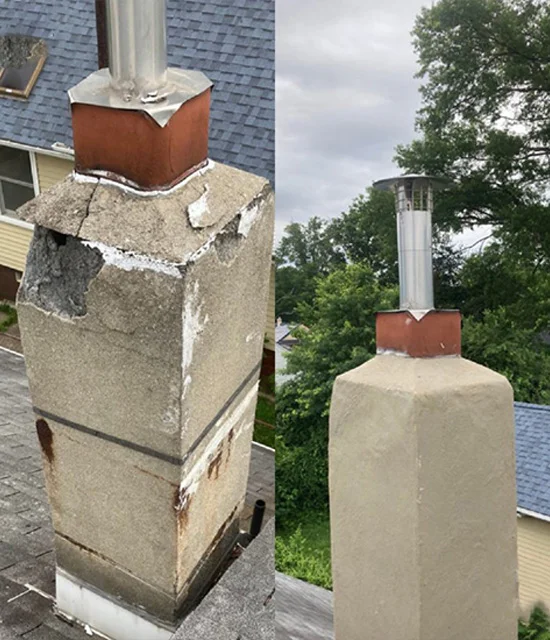
Strong winds and storms can create large cracks, loosen bricks, or damage your chimney cap. Our experts inspect and reinforce chimneys to prevent severe structural damage and ensure your chimney meets safety standards.
Cause: Settlement and foundation issues.
Repair: Flexible chimney mortar and stabilization to maintain chimney safety.
Cause: Thermal expansion or freeze-thaw cycles.
Repair: Minor repairs with new mortar joints or professional reinforcement.
Cause: Uneven settling of the foundation.
Repair: Replace damaged bricks, apply new mortar, and ensure structurally sound masonry.
Cause: Weather exposure on the chimney crown at the very top of the roof.
Repair: Chimney crown repair using waterproof sealants and protective coatings.
Cause: Water leaks or trapped moisture leaving salts on brick surfaces.
Repair: Replace damaged bricks, apply two coats of masonry sealant, and prevent water intrusion.
Cause: Serious foundation issues or structural damage.
Repair: Stabilize foundation, install supports, and brace the chimney structure.
Cause: Rust, age, or weathering.
Repair: Chimney cap repair or replacement to protect against debris, water, and pests.
Cause: High heat, chimney fires, or corrosive gases.
Repair: Replace flue tiles or flue liner, restoring chimney safety and preventing carbon monoxide hazards.
Cause: Weather, moisture, or age.
Repair: Apply new mortar, tuckpoint mortar joints, and restore brickwork integrity.
Call GMT Home Services if you notice:
Ignoring problems can increase total cost and lead to chimney replacement or severe structural damage.
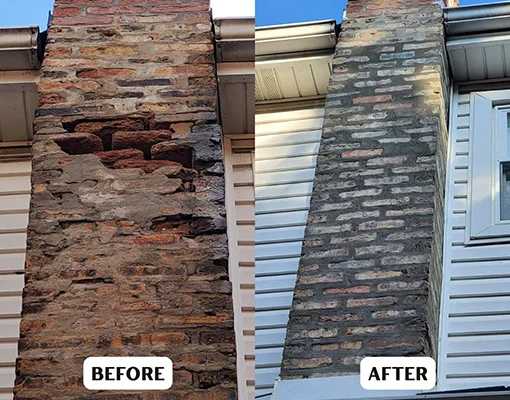
Harsh winters bring snow, ice, and freeze-thaw cycles that can worsen small cracks or cause damaged mortar joints in your brick chimney. Schedule an annual inspection to ensure your chimney remains structurally sound and safe during cold weather.
Every repair is tailored for proper repairs, ensuring your masonry chimney remains safe and functional.
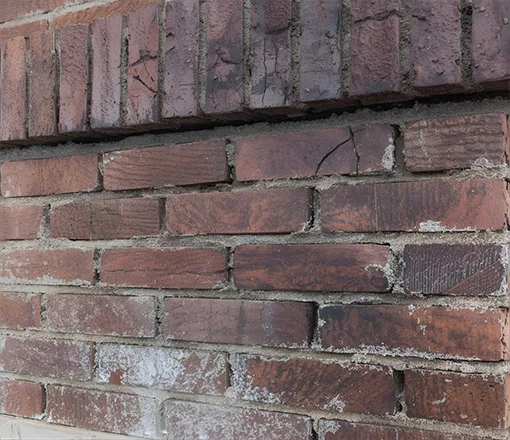
Chimney repair costs vary based on:
Repair costs for minor cracks are low, while large cracks or substantial damage may result in cost upwards significantly higher.
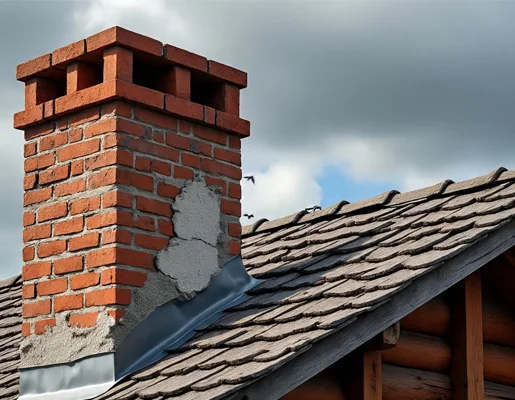
Heavy rains can lead to water leaks, moisture damage, and deterioration of your chimney crown or masonry chimneys. Our chimney crack repair and waterproofing services protect your chimney and home from costly repairs.
Proper maintenance keeps most chimneys safe, efficient, and long-lasting.
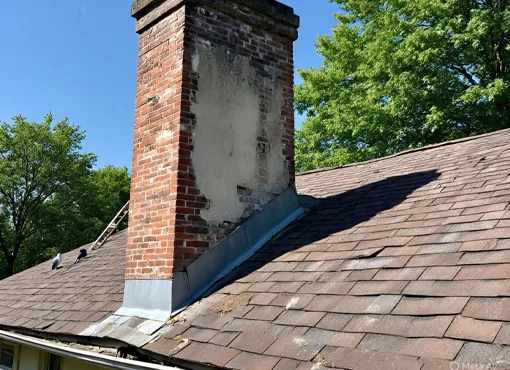
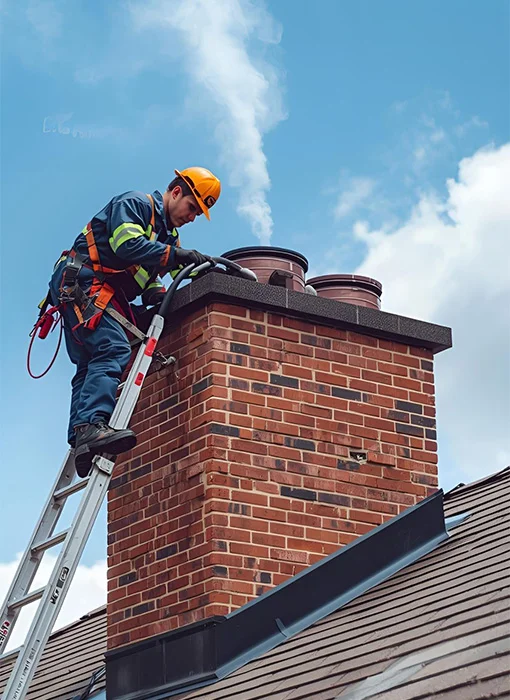
Don’t let minor chimney damage turn into severe structural damage. Trust GMT Home Services for chimney crack repair and comprehensive chimney repair services.
Cracks can result from foundation movement, weathering, thermal expansion, chimney fires, or creosote buildup. Small cracks may need minor repairs, while larger ones could require extensive brick chimney repair.
Look for visible cracks, water leaks, crumbling mortar, damaged flue tiles, or a leaning chimney. Annual inspections by certified experts help prevent serious damage.
Yes. Even minor cracks can let water in, causing brick and mortar deterioration. Early repairs prevent costly damage later.
Repairs can involve brick replacement, tuckpointing, chimney crown repair, flue or liner replacement, waterproofing, and stabilization for leaning chimneys—all following CSIA safety standards.
Costs vary by damage type, chimney size, accessibility, and materials. Minor repairs are affordable, but large cracks or structural damage can be significantly higher.
The crown is the top of the chimney that protects against water and debris. Cracks allow moisture in, causing masonry deterioration. Repairing the crown prevents further damage.
Schedule regular inspections, clean creosote buildup, apply waterproof sealants, and address minor damage promptly to avoid costly repairs.
Yes. Cracked flue tiles or liners can compromise safety. Professional repair or replacement restores proper function and prevents hazards like carbon monoxide leaks.
EXCELLENTTrustindex verifies that the original source of the review is Google. GMT Chimney Services did an outstanding job installing a new liner in my chimney. Their price was nearly half of what other companies quoted, and the work was excellent. My chimney wasn’t drafting correctly, which caused my water heater to break. After the liner was installed, the issue was completely resolved. Highly recommend for their fantastic work!Posted onTrustindex verifies that the original source of the review is Google. Outstanding service with Joe he was very helpful and I would recommend gmt and JoePosted onTrustindex verifies that the original source of the review is Google. We had Joe work on a gas fireplace in our new home. He was prompt, polite, and a pleasure to deal with. I would absolutely use this company again and felt he went above and beyond to assist usPosted onTrustindex verifies that the original source of the review is Google. 3.5 stars Not the worst not the best experience.. the guys that came and did inspection were great and knowledgeable, the guys that came and did the liner were also great.. Juan that came to check out my fireplace and put on the caps was excellent.. the guys that came and did the pointing, and outside work did ok work but didnt communicate with us... never rang doorbells or gave us calls, not good communication.... this comapny expect you to be home almost at all times says they will work with you in times so, scheduled a day to come work and needed someone to be home wife took day off and they tried to tell us no one was home didn't even knock or ring door bell... just left tried to tell us no one was home and that they rang door bell and knocked.. we have cameras and ring door bell and wife took day off.. one week goes by no calls nothing gave us 30 min notice called abut 9a.m to show up around 930... again the workers were all pretty good but the communication between them the lady in the office and home owners should be better.. she Called and asked for payment job wasn't complete.. caps were not install.. Juan came out again was great did what he had to do and bill was paid.. I'd love to use them again for a cleaning because the work was ok and some of the guys doing the work. But they need to realize that people work for a living and cant be home at all times and some of the workers and the office need to be able to communicate with the home owners and possibly each other a bit better.. the pricing was average better then some others and work was overall ok.. if your someone that can be home often this company will be perfect for youPosted onTrustindex verifies that the original source of the review is Google. Joe was fantastic and very quick! Looking forward to using this service again!Posted onTrustindex verifies that the original source of the review is Google. Very good service, installed a liner in a few hours. Very professional. Would use again!Posted onTrustindex verifies that the original source of the review is Google. Nice workPosted onTrustindex verifies that the original source of the review is Google. Joe came to check my fireplace since I wanted to make sure I was good for the season before lighting it. He did a wonderful job of explaining that the fireplace was safe to use this year and advised me of when to contact them for a cleaning. He checked the firebox, and explained what was happening in the flue. I will certainly be calling GMT again for my future cleanings because of this interaction. Joe was friendly and warm, and did a great job explaining how to use the fireplace.Posted onTrustindex verifies that the original source of the review is Google. Great service! Joe is a real professional. Very thorough and with a lot of patience. Recommend with all my heartPosted onTrustindex verifies that the original source of the review is Google. I would highly recommend GMT services. Joe is not only very professional and knowledgeable as well as respectful of time. The fact he got the job done within minutes shows how experienced he is.Verified by TrustindexTrustindex verified badge is the Universal Symbol of Trust. Only the greatest companies can get the verified badge who has a review score above 4.5, based on customer reviews over the past 12 months. Read more